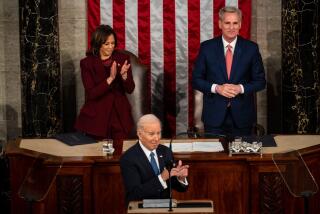Standing Firm on Medicare
- Share via
Key congressional leaders have rejected calls to rewrite the Medicare-expansion law that came into effect Jan. 1, and we think that they are right.
Many Medicare beneficiaries are objecting to the fact that the additional services, including expanded acute care in hospitals and coverage for prescription drugs, will be financed by the beneficiaries themselves through an income-tax surcharge on those with higher incomes. At a time when the nation is rapidly graying, there is no equitable alternative. The shrinking work force can hardly be expected to subsidize these expanded services for the growing population of older Americans. Furthermore, the benefits are a bargain.
Sen. Lloyd Bentsen (D-Tex.), chairman of the Finance Committee, and Rep. Dan Rostenkowski (D-Ill.), chairman of the Ways and Means Committee, are standing firm behind the new law.So they should. To reject this reform would be to doom other essential expansions of service, including long-term-care insurance, that can be developed by Congress only if at least some of the cost is borne directly by the beneficiaries.
A majority of Medicare beneficiaries will pay only a basic monthly fee for the added protections--$4 for the current year, rising to $10 in 1993. For the 40% of the seniors with higher incomes, there is an additional income-tax surcharge--15% of tax liability for this year, rising to 28%, or a maximum of $1,050, in 1993. Congressional estimates underscore the fact that even at maximum fees these are bargains, representing a substantial subsidy. “An individual who pays the maximum supplemental premium of $1,050 in 1993 will still receive, on average, a subsidy of approximately $1,700,” according to Rep. Pete Stark (D-Oakland), one of the authors of the legislation.
More to Read
Get the L.A. Times Politics newsletter
Deeply reported insights into legislation, politics and policy from Sacramento, Washington and beyond. In your inbox twice per week.
You may occasionally receive promotional content from the Los Angeles Times.










